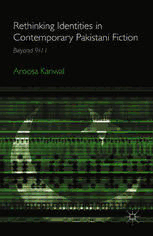
Rethinking Identities in Contemporary Pakistani Fiction: Beyond 9/11 PDF
Preview Rethinking Identities in Contemporary Pakistani Fiction: Beyond 9/11
Rethinking Identities in Contemporary Pakistani Fiction This page intentionally left blank Rethinking Identities in Contemporary Pakistani Fiction Beyond 9/11 Aroosa Kanwal International Islamic University, Pakistan © 2015 Aroosa Kanwal Softcover reprint of the hardcover 1st edition 2015 978-1-137-47843-6 All rights reserved. No reproduction, copy or transmission of this publication may be made without written permission. No portion of this publication may be reproduced, copied or transmitted save with written permission or in accordance with the provisions of the Copyright, Designs and Patents Act 1988, or under the terms of any licence permitting limited copying issued by the Copyright Licensing Agency, Saffron House, 6–10 Kirby Street, London EC1N 8TS. Any person who does any unauthorized act in relation to this publication may be liable to criminal prosecution and civil claims for damages. The author has asserted her right to be identifi ed as the author of this work in accordance with the Copyright, Designs and Patents Act 1988. First published 2015 by PALGRAVE MACMILLAN Palgrave Macmillan in the UK is an imprint of Macmillan Publishers Limited, registered in England, company number 785998, of Houndsmills, Basingstoke, Hampshire, RG21 6XS Palgrave Macmillan in the US is a division of St Martin’s Press LLC, 175 Fifth Avenue, New York, NY 10010. Palgrave is the global academic imprint of the above companies and has companies and representatives throughout the world. Palgrave® and Macmillan® are registered trademarks in the United States, the United Kingdom, Europe and other countries. ISBN 978-1-349-50231-8 ISBN 978-1-137-47844-3 (eBook) DOI 10.1057/9781137478443 This book is printed on paper suitable for recycling and made from fully managed and sustained forest sources. Logging, pulping and manufacturing processes are expected to conform to the environmental regulations of the country of origin. A catalogue record for this book is available from the British Library. A catalog record for this book is available from the Library of Congress. Typeset by MPS Limited, Chennai, India. For my parents I certainly could not have done it without their support This page intentionally left blank Contents Acknowledgements viii Introduction 1 1 How the World Changed: Narratives of Nationhood and Displaced Muslim Identities 18 2 Responding to 9/11: Contextualising the Subcontinent and Beyond 73 3 Re-imagining Home Spaces: Pre- and Post-9/11 Constructions of Home and Pakistani Muslim Identity 112 4 Global Ummah: Negotiating Transnational Muslim Identities 157 Coda: Re-imagining Pakistan 198 Notes 201 Bibliography 208 Index 219 vii Acknowledgements Praise be to Allah, Lord of the worlds I am indebted to numerous people for their support during the writ- ing of this book. For its early intellectual formations, I am particularly thankful to Dr Lindsey Moore, my exemplary PhD advisor at the University of Lancaster, UK, whose invaluable critique, gentle wisdom and great patience forced me to explain myself more fully; I have learnt so much from you. I am also indebted to Dr Claire Chambers for her intellectual feedback and valuable suggestions, prompting me to look at aspects I would otherwise have missed. Special thanks to Dr Sarah Post for her advice to improve the Introduction. On a personal note, I am especially grateful to Professor Lynne Pearce for her constant support, encouragement and for the prompt communication at all times, from the time of writing the book proposal to the completion of the manu- script. I owe particular thanks to Alan McIntosh and Palgrave editors Benjamin Doyle and Tomas Rene for their patient guidance. I would like to thank my mother and father for their unfaltering sup- port, love and prayers. Without their encouragement and help I would not have been able to write this book. My thanks are due to my fam- ily for the co-operation and help they extended to me throughout my research work. I feel very lucky to have Professor S.M.A. Rauf as my mentor. I would particularly like to thank him for inspiring me to pursue my ambitions. I also owe a special thank you to Dr Hassan Ahmed not only for the laborious task of editing my work but also for supporting me in all ways to bring this book to its final fruition. Many thanks to Valerie Smith for rich and friendly intellectual debates. I am so grateful to both of you for lifting my spirits, and for too many other things to enumerate. Thanks to Lucy Perry for all the motivation and inspiration. I am very grateful to Waleed and Ahmed for endless discussions on politics and history. I would like to extend my gratitude beyond the academic circle to thank Paula, Vijaya, Novida, Maria, Tajmina, Saiyma, Nighat, Komal, Sofia, Amal and Uzma for their prayers, best wishes and ever-present support. A special note of thanks goes to all those colleagues and stu- dents at International Islamic University not named here, but who gave viii Acknowledgements ix me strength and motivation throughout. Thanks to Dr Munazza Yaqoob for making my return to the university easier for me. A part of Chapter 3 was published as “After 9/11: Islamophobia in Kamila Shamsie’s Broken Verses and Burnt Shadows” in Imagining Muslims in South Asia and the Diaspora: Secularism, Religion, Representations, ed. by Claire Chambers and Caroline Herbert (UK: Routledge, 2014) 185–197. A shorter version of a section in Chapter 4 was published as “After 9/11: Trauma, Memory, Melancholia and National Consciousness” in Consciousness, Theatre, Literature and the Arts 2011, ed. by Daniel Meyer- Dinkgräfe (UK: Cambridge Scholars Publishing, 2012) 57–66. I am grateful to Routledge and Cambridge Scholars Publishing for permissions to reproduce the copyright material.
